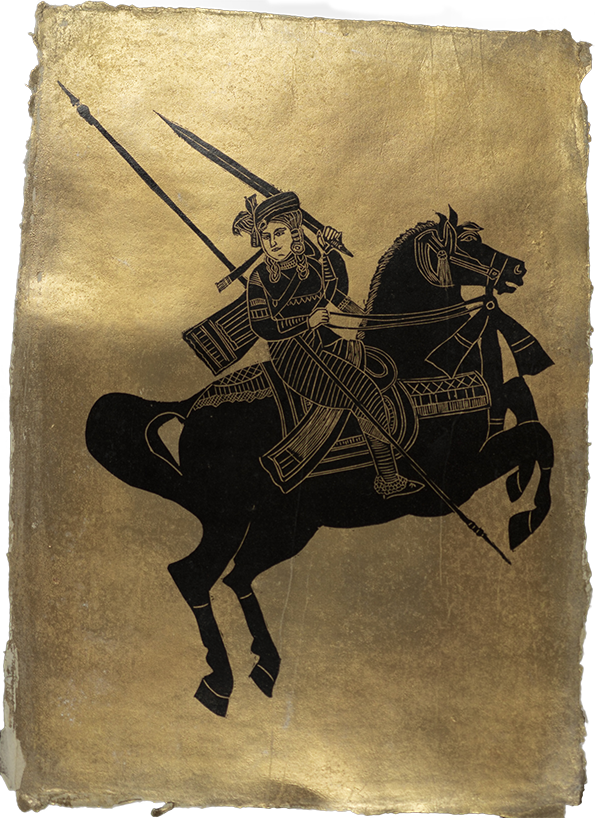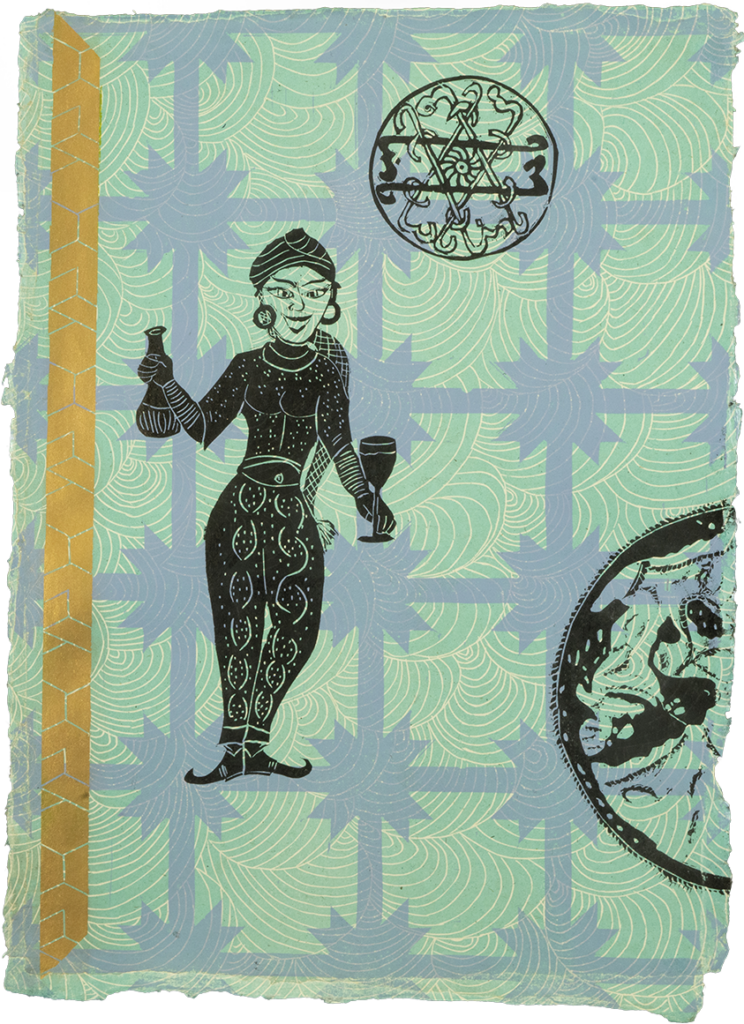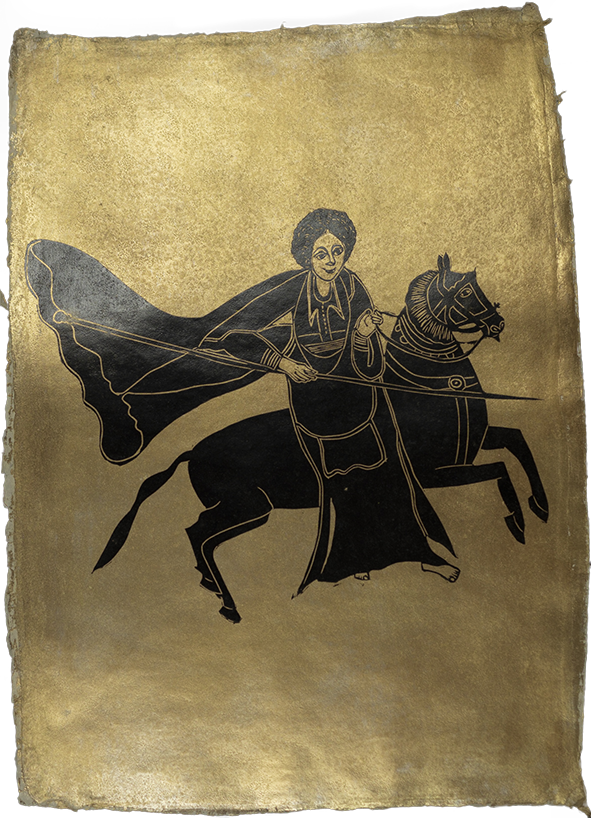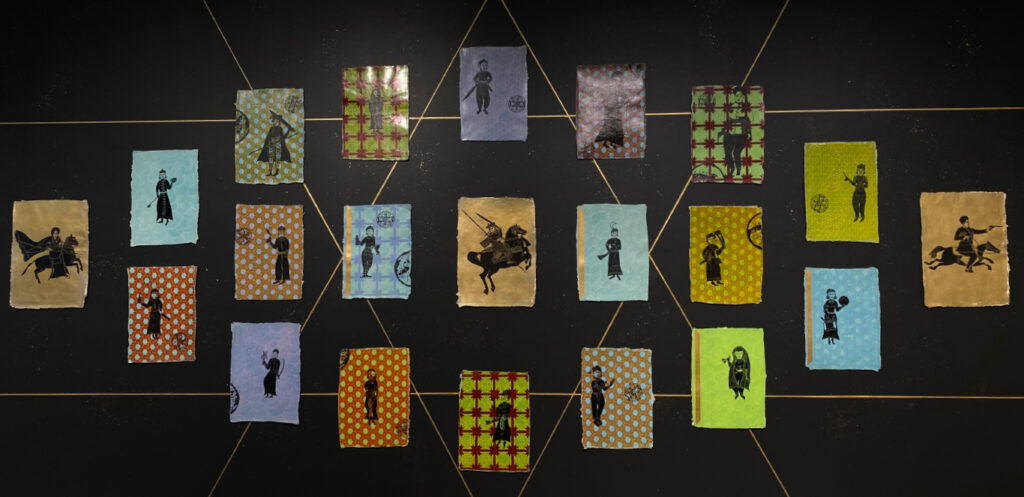
Sarah K. Khan
Undisciplined Pleasures
Vigilant Defiance 2.0
Intoxicated by the Wine of Love.
From each a mystic silence Love demands.
What do all seek so earnestly? ‘Tis Love.
What do they whisper to each other? Love.
Love is the subject of their inmost thoughts.
In Love no longer ‘thou’ and ‘I’ exist,
For Self has passed away in the Beloved.
Now, will I draw aside the veil from Love,
And in the temple of mine inmost soul,
Behold the Friend; Incomparable Love.
He who would know the secret of both worlds,
Will find the secret of them both, is Love.
—Farid ud Din Attar, The Jawhar Al-Dhat (translation Margaret Smith)
A Love Letter to Badmash Women
Jasmine Wahi
I n the summer of 2020, I had the esteemed privilege of working with the multi-hyphenate cultural practitioner (Botanist x Printmaker x Culinary Scientist = overall sensorium master) Sarah K. Khan. I had long admired Sarah’s work, which I was introduced to through South Asian Women’s Creative Collective (SAWCC) many years ago. What I was unprepared for when she joined our Feminist Incubator cohort at Project for Empty Space, was the scope and breadth of her practice. To understand this particular body of work, Undisciplined Pleasures, Vigilant Defiance 2.0, one must understand the depths and layers of thought, care and tenacity that go into each and every piece.
Undisciplined Pleasures 2.0 is a collection of eighteen stratified prints celebrating Feminist Freedom Fighters, many of whom have been intentionally erased or invisibilized from hegemonic Western (and sometimes Eastern) histories. العزى (Uzza); مرجان (Marjan); مناة (Manāt); نهى (Nuha); فاطمة (Fatima); ጉዲት (Gudit); ਅੰਮ੍ਰਿਤਾ (Amrita); زلیخا (Zuleka); ![]() (Hatshepsut); مزه (Maza); اللات (Lāt); ጽጌሬዳ (Tsidgera); ताशुं (Tashu); خديجة (Khadija); ፍሬ ዓለም (Fere Alem); ቢልጊስ (Bilqis);جلاله الد د ینر ضیه (Razia); አበበች (Abebach), all appear, resplendent in their effervescent and radiating strength and transgressing the limitations of imperial erasure. They are a pantheon of power, not only for the intersecting South Asian, Middle Eastern, and Pan African cultures that originate from, but for femmes globally. Khan’s work reaffirms these women in the annals of global history.
(Hatshepsut); مزه (Maza); اللات (Lāt); ጽጌሬዳ (Tsidgera); ताशुं (Tashu); خديجة (Khadija); ፍሬ ዓለም (Fere Alem); ቢልጊስ (Bilqis);جلاله الد د ینر ضیه (Razia); አበበች (Abebach), all appear, resplendent in their effervescent and radiating strength and transgressing the limitations of imperial erasure. They are a pantheon of power, not only for the intersecting South Asian, Middle Eastern, and Pan African cultures that originate from, but for femmes globally. Khan’s work reaffirms these women in the annals of global history.
The physical composition of each unique edition is as important as the subject matter. Though trained in academic disciplines, Khan chose printmaking as an international nod to the multifaceted and complex histories embedded within these narratives. Each piece contains layers upon layers of paper and pulp substrates, gold leaf, block printed patterns in the Mughal/Islamic style, and pungently nostalgic masala spices (including- Black Pepper, Cloves, Rose, Cinnamon, and Myrrh). “Viewing” the works is not simply a visual exercise, but a multisensory experience that evokes memory through a myriad of avenues. It is worth noting that each print is imperfect, an element that Khan wholeheartedly embraces. They are intentionally as flawed – nuanced and messy- as we are. Perfect in their imperfection. These prints contain within them a rasa or essence of each icon portrayed.
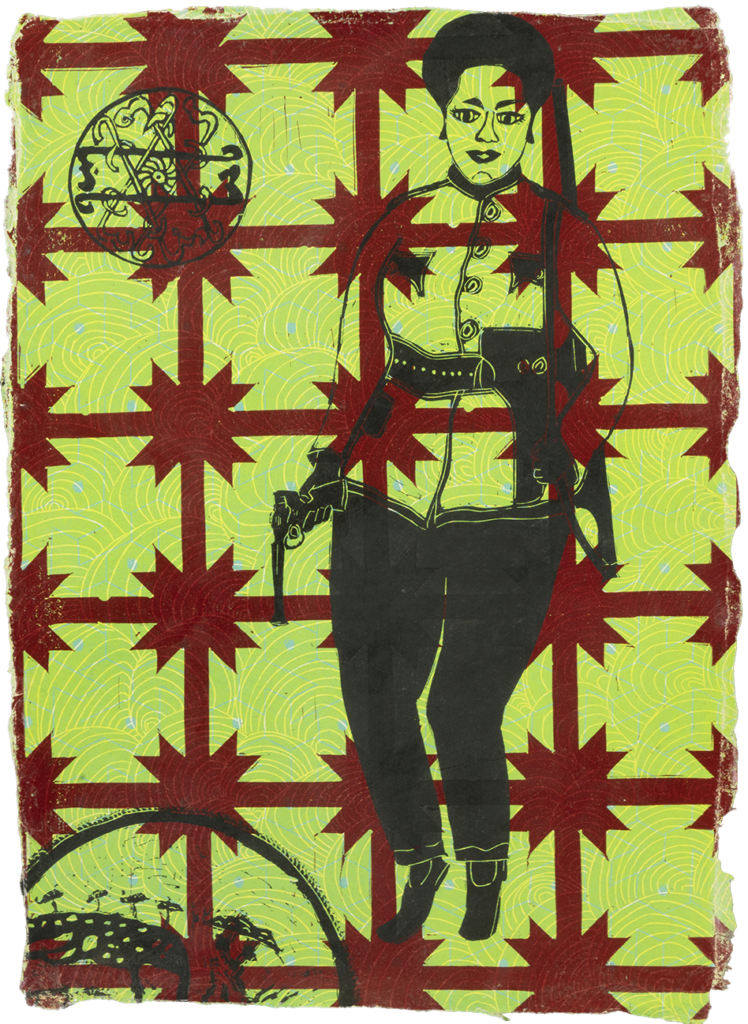
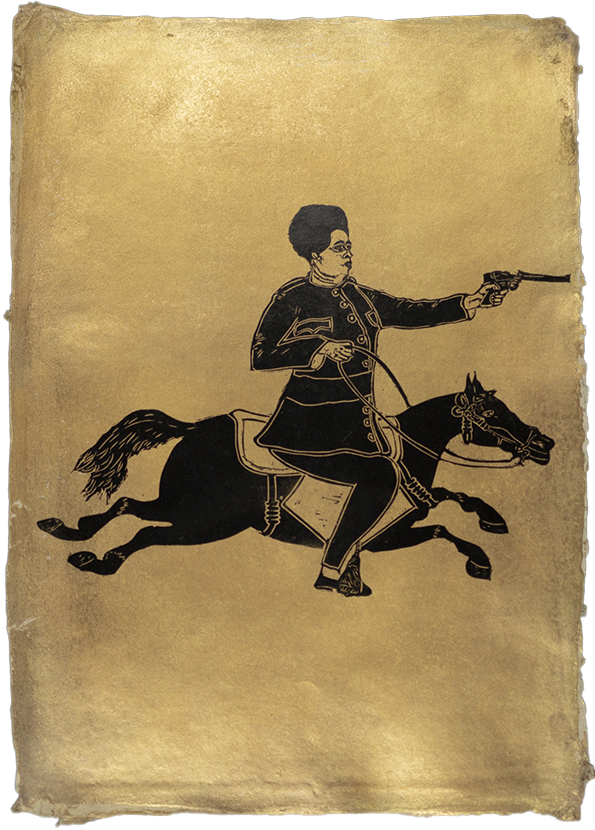
In addition to the composition of each work, the original installation of all eighteen pieces was an essential part to understanding the interconnectivity of femme/feminist power across the ‘Global South’ (for lack of a better term). At Project for Empty Space, Khan’s fierce
Vigilantes traversed a matte black galaxy across the entirety of a twenty foot wide wall. Connected by golden lines that mimicked a deconstructed Islamic architectural patterning, the Pantheon functioned as a collective expanse- a kambal (blanket) of ferocious, unapologetic,
pleasure and defiance. To be in the presence of this astrological installation is dually overwhelming and comforting. Much like the warrior
women shown, there is a sense of both/and (violent/loving, intimidating/pleasurable, ferocity/mischievousness) in the entire piece.
The individual prints AND the cosmological installation as a whole are essential to understanding the larger power of Khan’s Undisciplined Pleasures. This work is not just important for us, South Asian/Middle Eastern/Pan African/Non-White/People of the Global Majority/Global South Femmes. It is critical for the larger global discourse. It is critical in the movement to disrupt and dismantle hegemonic
White/Euro-Centric histories and narratives that have long dominated discourses across the world. Khans’ work creates a type of reemergent visibility for our histories. It creates the necessary multicentricity and re-centricity on the erased cultural rasas that make us who we
are. Without this intervention of fearless Black and Brown femmes into the dominant canons, we are only understanding partial pictures.
It is through this work, this galactic exploration of eighteen unapologetic role models, that we can begin to understand ourselves and see
ourselves for the powers and purposes that we contain in our multitudes.
The Simmering Power of Naming
Banu Subramaniam
South Asia is a world of stories. Mythological and folk tales offer rich cosmological imaginations. Plants – their roots, shoots, leaves and flowers – weave seamlessly into glorious tales of this world and beyond. In these stories, plants are never sedentary or unintelligent beings, but active agents that built community and enable imaginative narrative plots. Plants house transmigrated souls of the divine, human and other sentient beings. For example, the sweet fragrant jasmine is said to emerge from the churning of the Ocean of Milk. The Tamarind tree, ever delicious for its sour fruit is a home for myriad spirits. Despite its considerable shade, we were advised not to rest under it, lest a spirit possess us! The Banana tree’s short life is entangled in tales of matrimony and children. The peepal tree (sacred fig) and the banana tree are considered husband and wife if they grow together. The sesame tree believed to have emerged when Lord Vishnu’s sweat drops fell on Earth. Plants were ubiquitous and essential – for food, as digestives, and cures for various ailments. I acquired this enchanted vision of plants despite being raised as an urban child. It is this rich imaginative history that fuels Sarah Khan’s Undisciplined Pleasures, Vigilant Defiance Series.
Once we entered school, however, a postcolonial education disenchanted our love of plants. The scientific Latin names we had to learn by rote erased the luxurious and magical contexts of our childhoods. They severed plants from the world we lived and knew. Botanical education, its universal terminology seemed sterile, abstract, absolute and without context. A study in botany and its Latin nomenclature was a study in alienation from the natural world. But learning the scientific term in Latin was enforced, and we were assured that because it was scientific, it was universal. Scientists across the world used the same terminology.
A postcolonial education transformed familiar plants into alien creatures. I loved the sweetness of dal cheeni (cheeni is sugar in Hindi), or pattai (pattai means piece of bark in Tamil), but once in school, it became Cinnamomum. I learned that there was “true” cinnamon, Cinnamomum verum, and the more popular Cinnamomum cassia. The local meanings that captured my experiences of chewing on the sweetness of the bark in a spicy curry was lost. Turmeric was manjal (yellow in Tamil). And so, on it goes…The local words for spices often described the spice or how it was used, it was embedded in lived lives.
Why couldn’t plants retain their local names? It was much later in life (not part of a botanical education) that I discovered the reason was for colonialists to be able to identify plants, and more efficiently extract the rich botanical resources from the colonies. Treatises like the Dutch commissioned Hortus malabaricus of the 17th century catalogued the rich flora of the Malabar region. Indeed, rich resources in any land, whether spices or oil or minerals, are historically seen as a “curse,” since the rich resources attract attention and intense interest for colonial powers.
Black pepper, the spice that was perhaps South Asia’s resource curse brought the colonists to its coast, first as traders and eventually as colonizers. The kaali mirch (kaali means black in Hindi) or kari milagu (kari is black in Tamil) again describe the plant and spice. This became Piper nigrum in my botanical education. There was a science to the spices – a logic to which spices you used and the combination you used them in. Spices were use each day not only in cooking but as perfumes, insect repellents, and as a cure for any number of ailments. Boiled cumin water helped as a digestive, an anti-histamine or as an anti-viral agent. Fennel and cloves helped with digestion. Ginger helped with flatulence. Spices abounded everywhere. Indeed, modern pharmaceuticals owe a great deal of their knowledge from indigenous medical wisdom from all across the word. The ongoing exploitation of this knowledge, the biopiracy of colonized worlds continues.
Sarah Khan’s representation of the book of delights highlights the ecological, historical sensorium of plants. Eighteen powerful and fully frontal femmes wield appliances and tools – rolling pins, knives, swords, a German Lugar, rulers, spoons, spears, wine glasses, fire and blow torches – for a cauldron of possibilities. These are not mere tools but tactile and sensual agents, patterned and bejeweled in gorgeous hues. The figures unleash the power of cooking, hunting, gathering, distillations, healing, perfumery. Rejecting any binary understanding of western femininity and masculinity, Khan presents a powerhouse of the eighteen goddesses. Uzza with her rolling pin and sword, Amrita and her wine glass and carafe, Fere Alem with her herbs and sword, Gudit and her blow torch. Razia wields powerful weapons but is also decked out in gorgeous anklets and earrings. The characters carry traditional tools of the kitchen and the battle field, blurring the lines of domesticity and war. The herbs, vegetables, wine alongside the rolling pins, swords, spears and cleavers foretell the power of the kitchen. And you may never be sure what is brewing!
Sarah Khan’s figures remind us that the world could have been otherwise. The histories they evoke remind us that other futures were possible. The characters force us to reckon with long suppressed histories, paths not taken, other words and worlds, unmuted.
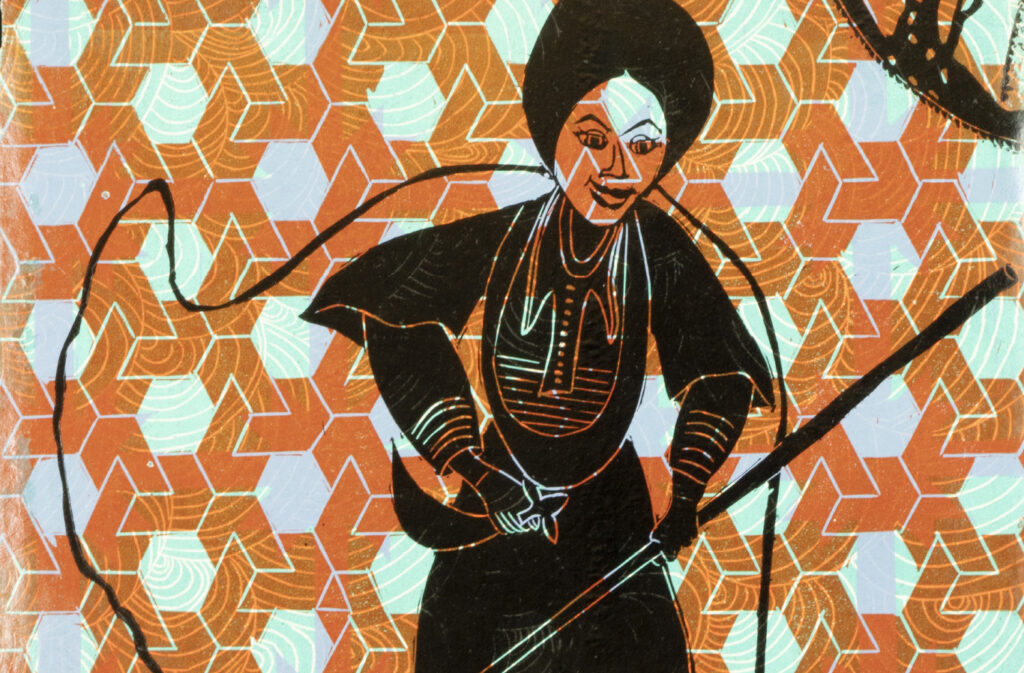
For Us, By Us, About Us
Marcia Minter
Indigo Arts Alliance (IAA) is a Black-led organization dedicated to the professional development and amplification of Black and
Brown artistic vision and practice. Founded in 2018 and formally launched in 2019, IAA is an incubator space with a mission to build
global connections by bringing together Black and Brown artists from diverse backgrounds to engage in creative process through an
Artists in Residency program.
Our core values are rooted in the founders having spent decades traveling to various locales that make up the African diaspora. In all
those years, the fact that the presence of African peoples in the African Indian Ocean World precedes that of the Black Atlantic World by
over one thousand years, remained a mystery. It was not until Sarah K. Khan accepted our invitation to be one of our inaugural Artists in
Residence that we learned of this deep and rich history.
And as they say, she did not come to play, she came to slay! Sarah K. Khan arrived with a carload full of books on the free and forced migration
of Africans and their descendants in the Africa Indian Ocean World, how the intersection of Islam and empires influenced South Asia,
and books written by a host of revolutionary Womyn freedom fighters of Black and Brown descent. Sarah embodies what Indigo Arts
Alliance means when we say we serve to amplify Black and “Brown” creatives. We are not only talking about melanated people who come
from countries impacted by colonization. We mean folks who are truly dedicated to social justice. Those who have an active consciousness
innately tuned to the work of allyship. Those unearthing the truth of history and disseminating stories that are simultaneously complicated
and beautiful. We embrace those who understand the power of art to dismantle all forms of oppression while striving to deconstruct
imposed narratives and while radically striving for a truly multiracial democracy.
As an artist, scholar and scientist, Sarah K. Khan has mixed her unique blend of brilliance. Over the course of two months in residency at
Indigo Arts Alliance and an additional month printing with the talented team at Wolfe Editions, she manifested Undisciplined Pleasures,
Vigilant Defiance 1.0 that exemplifies the power of imagination. Her imagination not only reveals erased female stories but also the arts of
food and healing via the reshaping of an illustrated cookbook from 16th C Central India, The Book of Delights.
In the 2.0 series, Sarah continues her explorations. She time travels. Sankofa style. Looking forward while “going back to get” the incredible
women marginalized and minimized by patriarchy, racism and misogyny. And in her loving hands, Sarah has literally imbued the spirit of
women like Freedom Fighter Abebach with her gun, Queen Bilqis with her spear, and Amrita Simla with her elixir soma. With fierce tools
of defense and nourishment, the 15 front-facing femmes embody dynamic powers and purpose—that of ingenuity, creativity, exuberance
and righteous defiance! As a skilled researcher, Sarah pulls from historical texts, South Asian and Arab visual imagery, botanical knowledge
systems, and the sensorium to lay the foundations for expanded stories to emerge. And emerge they do. Femmes materialize from tightly
layered psychedelic Islamic geometric patterns—similar to the 1.0 Series, where the sheroes ride off, or on to, the printed pages—in 2.0
they stride decidedly forward, in fashionable shoes, I might add.
Sarah created one starting point, out of an endless number of possible starting points, for each story to emerge. The exquisite 2.0 prints
expand upon her pantheon of women warriors; her femmes remind us that cosmopolitan worlds of Africans, Arabs and Asians coexisted
long before European colonization of the seas and lands. Having immersed us profoundly in the intricate layers of heretofore unimagined
lives, we as viewers can admire vicariously. In fact, we are encouraged to imagine the infinite possibilities that are our own futures.
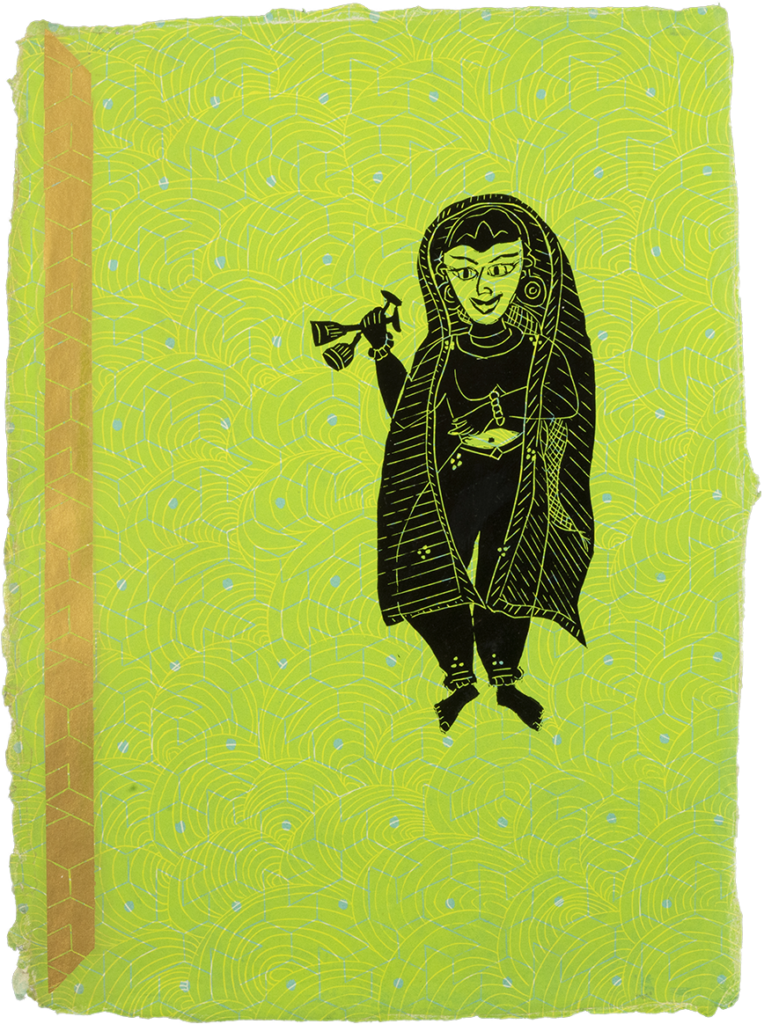
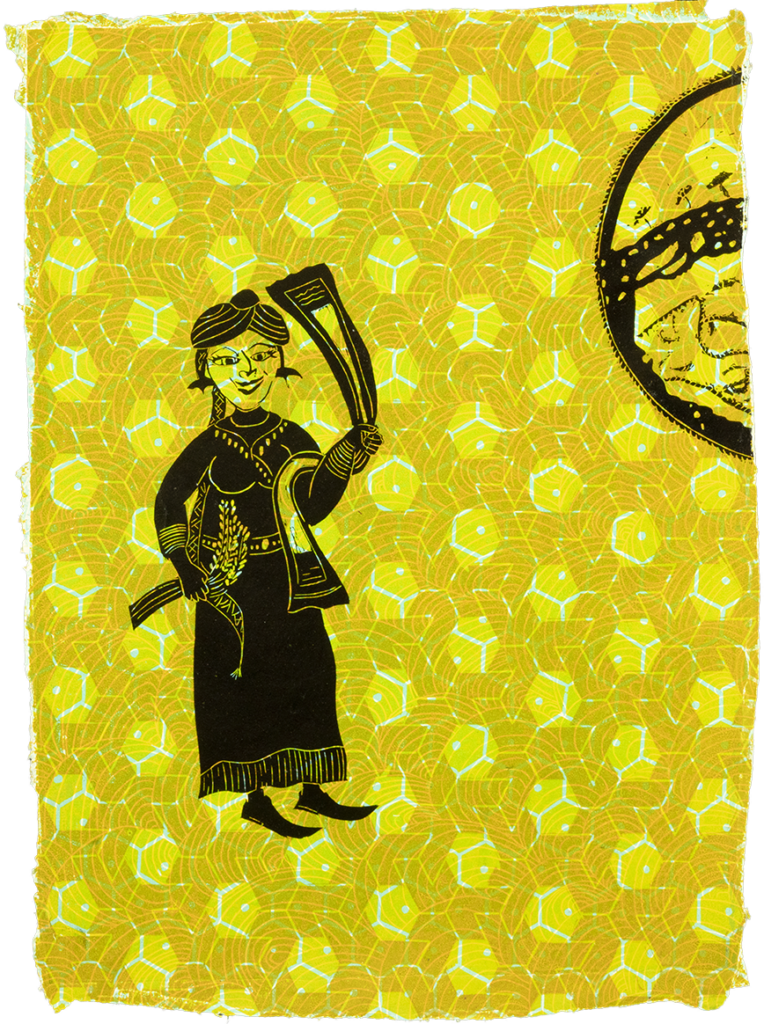
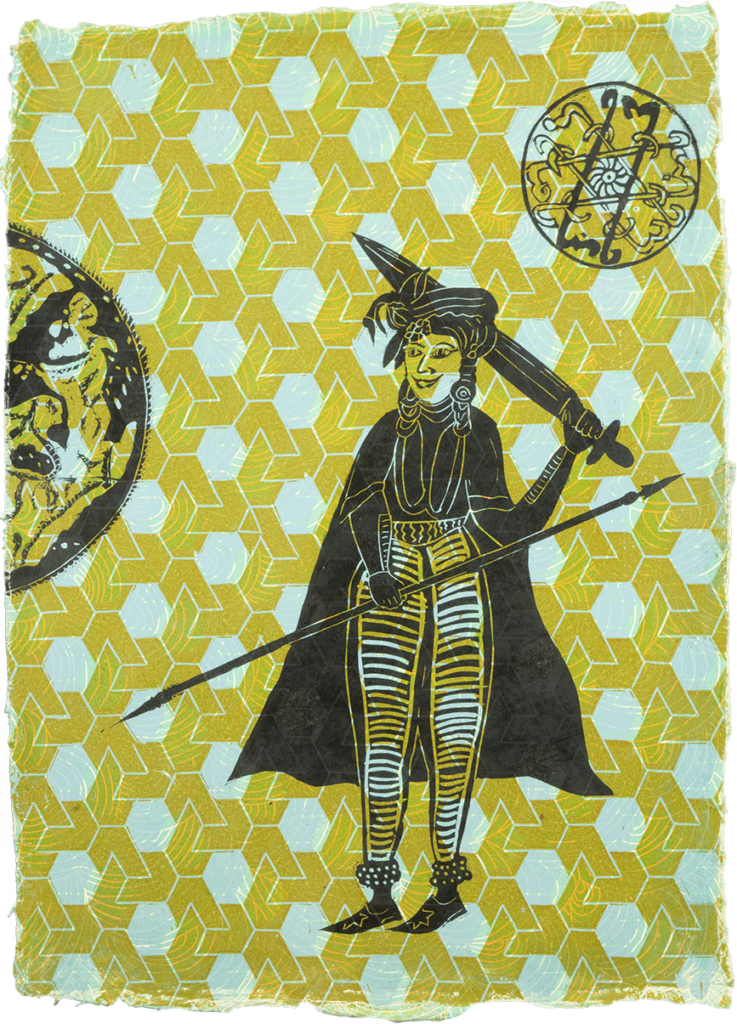
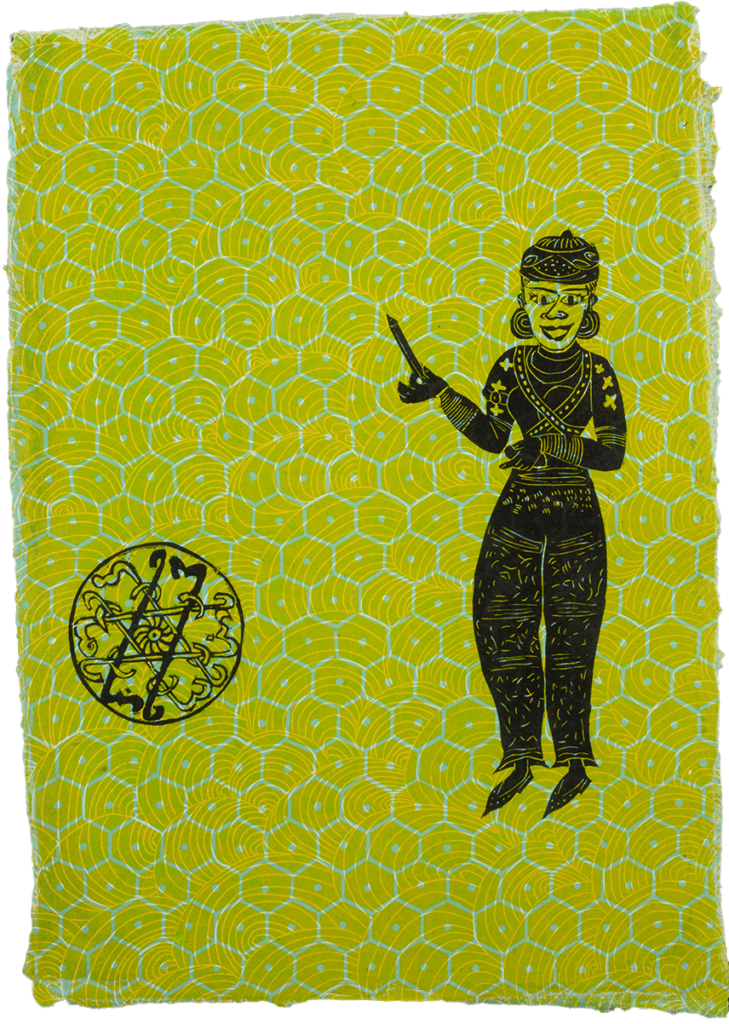

SARAH K. KHAN
Sarah K. Khan, a two-time Fulbright Scholar (2001-02 & 2014-15),
creates multimedia content about food, culture, women, and migrants
grounded in social justice. Khan earned a BA in Middle Eastern history
and Arabic (Smith College), two Masters (public health and nutrition,
Columbia University) and a Ph.D. (traditional ecological knowledge
systems, plant sciences, New York Botanical Garden-CUNY).
The goal is to make invisible visible, bear witness, and relay the
stories of migrants, through the lens of food with photography,
film, interactive maps and stories. Sarah’s photography, films,
and writing have also appeared in Museum of the Moving Image,
Queens Museum, Asian Arts Initiative, AAWW Open City, Roads and
Kingdoms, Culinary Backstreets, The Art of Eating, Modern Farmer
and Yahoo India. She has numerous solo, group shows and screenings
highlighting her photography, documentary films and prints.

JASMINE WAHI
Jasmine Wahi is the Founder and Co-Director of Project for Empty Space, a nonprofit organization rooted in Newark, NJ, and soon to be in New York City. Her multi-faceted curatorial practice predominantly focuses on issues of femme empowerment, complicating binary structures within social discourses, and exploring multi-positional cultural identities through the lens of intersectional feminism.
While co-directing PES, Ms. Wahi became the inaugural Holly Block Social Justice Curator at the Bronx Museum of the Arts in 2020. While at the museum she curated several renowned exhibitions, including Born In Flames: Feminist Futures and Wardell Milan: AMERIKA. God Bless You If It’s Good To You, which were oriented around the thesis that visibility is the primary tenet of Social Justice. In addition to her work at more formal institutions, Ms. Wahi also curates exhibitions and lectures internationally on dismantling White Supremacist, Capitalist, Patriarchal structures in the cultural realm and beyond. Recent notable engagements include her 2019 TEDx talk on intersectionality and visibility, entitled All The Women In Me Are Tired; and a group exhibition entitled American Truth at the SVA Chelsea Galleries.
Ms. Wahi has taught at a number of art institutions, including Yale University, and the School of Visual Arts: MFA Fine Arts department. She is currently on the Faculty of Brooklyn College in New York City. Ms. Wahi received her Art History education from New York University, where she has a BA in Art History from the College of Arts and Sciences, and an MA from the Institute of Fine Arts.

BANU SUBRAMANIAM
Professor Subramaniam received her Bachelor of Science from the
University of Madras, India, and her Ph.D. in Zoology and Genetics
from Duke University. Originally trained as an evolutionary biologist
and plant scientist, Subramaniam’s pioneering research in Feminist
Science Studies has made her a leader in the field. Her work explores
the philosophy, history, and culture of the natural sciences and
medicine as they relate to gender, race, ethnicity, and caste. Her
latest research rethinks the field and practice of botany in relation to
histories of colonialism and xenophobia and explores the wide travels
of scientific theories, ideas, and concepts as they relate to migration
and invasive species.
Subramaniam’s newest book, Holy Science: The Biopolitics of Hindu
Nationalism (University of Washington Press, 2019) won the 2020
Michelle Kendrick Memorial Book Prize from the Society for Literature,
Science & the Arts. Her previous book, Ghost Stories for Darwin:
The Science of Variation and the Politics of Diversity (University of
Illinois Press, 2014), was winner of the Ludwik Fleck Prize 2016 for
an outstanding book across the breadth of science and technology
studies. She is co-editor of Feminist Science Studies: A New
Generation (Routledge, 2001) that put Feminist Science Studies on the
map.

MARCIA MINTER
A seasoned creative professional, dedicated arts advocate and
community leader deeply committed to social and cultural activism.
Marcia Minter’s work on numerous boards represents the interest of
underrepresented voices, talents and citizen constituents. Minter is
the co-founder and Executive Director of Indigo Arts Alliance, a nonprofit that is a Black led artist residency program providing Black and
Brown artists from around the world a supportive environment in
which to make new work, receive critical feedback and build lasting
relationships across generations. IAA is a 2021 recipient of The Andy
Warhol Foundation for the Visual Arts Grant.
Her curatorial work focuses on photography, symposiums on the
intersection of art and social practice, exhibition planning and
implementation. Currently she serves on the Maine Arts Commission,
and is a Trustee of the Portland Museum of Art and Haystack Mountain
School of Crafts. She is a thought leader and advisor on projects for
the Federal Reserve Bank of Boston, the Holocaust and Human Rights
Center of Maine, the Children’s Museum and Theater of Maine. She is
a founding member of The Creative Justice Initiative, Colby College’s
Freedom & Captivity Advisory Board and the National Black Arts
Coalition. Marcia has received recognition as 50 Mainers Creating
a Brighter Future, Distinguished Institute for Civic Leadership Alum
Award, Honorary Degree of Doctor of Fine Arts, Maine College of Art.
Marcia believes art + culture = everything.
